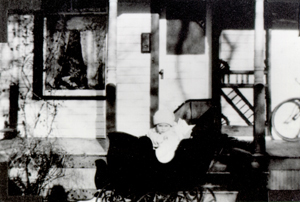Doris Jane Greenacre's Memories of her Great-Uncle, Ansel Watrous
from a speech given on January 28, 1985
at Colorado State University to the Western Interest Group

Ansel Watrous, one of Fort Collin's early residents and author of History of Larimer County, was 80 years old when his great grand niece by marriage, Doris Brollier, was born in Fort Collins in 1915. Watrous was widowed the same year after sixty years of marriage to Floral Thompson Watrous. In 1917 he married his late wife's widowed sister, Helen Thompson Gros who was Doris's grandmother. Thus, although he was always known as "Uncle," he had become "step-grandfather" to Doris. Her parents moved to the older couple's house, which became home to the extended family. In 1919 Watrous was still working as editor of the Larimer County Democrat and never gave up his professional interests. He served as a Justice of the Peace during his great grand niece's childhood and he was working on a manuscript at the time of his death at 92.
"We had that special relationship that sometimes develops between the very old and the very young," Doris recalled. "Uncle's patient consideration and kindness to me created interests and memories that have held down through the years."
She had vivid memories of a special outing when she was about five, going to Zimmerman's Hotel for Sunday dinner. Ansel and Helen Watrous hired a touring car with jump seats. Doris was dressed in a white summer dress, embroidered with yellow and white daisies. "I wore black patent leather slippers and I was on my best behavior. He always treated me as though I were a small adult, not a child. Watrous often gifted her with books. "He introduced me to Treasure Island, Black Beauty, Robinson Crusoe, and Uncle Wiggley. He had me convinced that he knew the authors because he would refer to them as 'My friend, Twain,' or 'my friend Burns.'"
To Doris, he was an impressive figure. "He was a study in black and white, as he strolled down the street, dressed in a dark suit, crisp white shirt, dark tie and dark fedora hat. His hair was snow white as was his moustache; he carried a gold handled cane. Sundays he often wore a frock coat, but when he came home from his work, he would change to a black smoking jacket trimmed in velvet. He had a hot toddy and a cigar while he waited for his dinner. If it was not ready by six, he would pace, snapping open and shut the case of his large pocket watch.
"He loved good cigars. And it was sort of a ritual every time he took out a cigar, I would stand by, hold out my finger and he would very carefully place the band around my finger."
Their dinner table was the scene of lively conversation and after dinner one of the adults would read aloud. Not surprisingly, the historian of Larimer County was a great story teller. "At bedtime, Uncle would call out, 'Which way is west, Girlie?' I would climb up beside him in his huge, black leather rocker and he would tell a tale of the early days, of the pioneers, the trappers and the Indians. Some of the stories left Doris wondering what happened next and were a bit scary to her. "At the end of the story he finished off with a wild war whoop."
He had pet nicknames for his great-niece. Names like "Girlie" or "Wildcat" and when she was too boisterous would say she "yelled like a Comanche."
He wrote Doris wonderful letters, which she has treasured through the years. One concerned her Christmas gift. He'd thought of airplanes, he wrote, automobiles, a gold watch, diamond rings as well as a half- bushel of onions and a dozen bottles of catsup. It occurred to him that a basket of puppies or crate of kittens would be acceptable, but he didn't like to separate families. "At last my eye fell upon an advertisement of the Youth's Home Companion." And though it was expensive for a year's subscription, this was his gift to her.
On her tenth birthday he wrote that he regretted he could not keep his promise of getting her a bicycle as his income had shrunk. In 1925 Doris' family spent the winter in Florida, and although he was ill and eventually hospitalized in Fort Collins, he wrote Doris a light-hearted letter, asking her to send him "two dozen thousand-legged worms, two dozen tarantulas, two dozen scorpions, selected stock. If they grow and do well, we will establish a Florida summer resort in Fort Collins with those innocent and charging and charming little creatures as the attraction."
Later he wrote that he was still in the hospital but being treated like a prince and "not suffering any pain or punishment in any way." He was telling stories to the other patients. He wished she were with him. "I think I would get well immediately."
Then in May he wrote that he thought St. Peter would let him into heaven because he had written the History of Larimer County.
When the family returned from Florida in June, Watrous was still hospitalized and would be until his death. Yet, "his eyes still sparkled and he could still chuckle at a good story and he could still tell one." In fact, Doris learned later that he was still writing.
"He became steadily more feeble, but was always patient and grateful for anything anyone did for him. But his war whoop days were over. He passed "into the land of the Good Spirit,'' as he would have said, on August 5, 1927, at the age of 92.


Preserving the history of Fort Collins, Colorado & the Cache la Poudre region